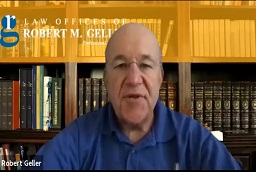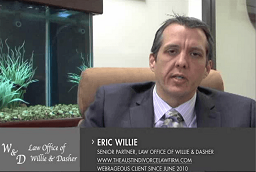
Gwen Beren
Table of Contents
Pay Per Click (PPC) Advertising or SEO
In our experience working with law firms, we find that there is a lack of understanding around online marketing, the strategies that are available, and the pros and cons of each.
The first tip would be to have a go-to person in charge of the online marketing at the firm. Even if that person’s only role is to work with a digital marketing agency. Oftentimes, we find there is either no ownership or there are too many cooks in the kitchen, making digital marketing challenging for all parties involved.
The second tip would be to do a Google search around a few of your key practice areas to see what competitors are coming up in the search results. Understand the difference between paid (“Sponsored”) search results at the top and the bottom of the pages and the results in between (“Organic” search results).
These two areas represent two different, but popular online marketing strategies. Paying for your listing to be found on the first page – known as Pay Per Click (PPC) advertising – is an expensive proposition, and we’d recommend hiring an expert for help in that area. The benefits of this strategy are immediate results in the search page results for practice areas you want to compete in. The challenge is making sure it’s a profitable exercise when one click can easily cost you over $200, and there are no guarantees that click is going to turn into a [client].
For this reason, many law firms turn to “search engine optimization” (SEO) – optimizing your website to get found “organically” in search results. Given the highly competitive nature of the legal industry, this also is an area probably best left to experts, as there are many, many factors involved in getting a website to rank on the first page. An SEO project is also not necessarily cheap, but given the costs of PPC, it’s easy to see where an upfront investment of a couple of thousand dollars will be more economical (assuming results are achieved) than the cost of ongoing PPC advertising. It’s not a one-time investment, but it also does not have the ongoing expense of a PPC campaign. The downside to SEO is that it’s generally a much longer time frame to see results (expect 6 – 12 months).
Other suggestions include: writing a blog regularly, leveraging social media to expand your “social ” presence (we’d also recommend an expert in this field), claiming all review sites, such as Google My Business, Yelp, etc., and working to collect positive reviews on those sites.
Website Design and User Experience
Attorneys looking to engage in digital marketing should begin with some self-inquiry: what do I want to get out of this activity? Once a business goal is in hand, the individual can begin to explore what digital marketing channels make the most sense for their needs, be it attracting new clients, raising awareness of the firm, or something else. For example, a firm looking to grow its clientele may want to begin advertising on platforms like Google Ads or the Facebook Ad Network. That said, attorneys should be mindful of their target audiences and where they spend time looking for information related to a particular legal vertical.
Additionally, law firms should take into consideration their website design and user experience. Both of these items can drastically impact their success in achieving their business goals. Difficult navigation, jargon-filled content, and the absence of easy-to-follow CTAs/forms all can hinder lead generation.

Need Google Ads Management Help?
Free Google Ads account review for
qualified clients
Almost 20 years experience

Andrew Clark

Joel Whipple
Focus on Your Niche
For lawyers and other legal professionals just getting into the digital marketing game, the best tip is to focus on your niche. This can mean a few things, but most importantly, start with what separates you and your firm from the competition. The online competition for major legal terms like the attorney is extremely competitive. As a result, focus on either the type of law your firm practices or legal services in your town/community, or the best strategy would be to focus on service and service area. It is very unlikely that a new firm would rank for a divorce attorney, but has a much better chance to rank for a divorce attorney in a small town, USA.
Visibility.
While word of mouth referrals still reign, online search is rising rapidly. In 2019, more than a third of clients started their search for an attorney on Google.
COVID-19 lockdowns accelerated the trend towards digital. The above numbers are likely higher today because previously offline-first people were required to move to a digital-first world.
Credibility.
When people look for lawyers online, they look at their online reviews. In our internal testing, we found that adding testimonials to a law firm’s page almost doubled the rate of leads coming in.
An attorney would do well to own their reputation and presence online instead of relying on legal directories to market their law practice.

Joe Ashta

Devin Ahern
There’s No “Get Rich Quick” Scheme to Organic Results
As you venture into the realm of digital marketing, you’re going to find quickly that there are two methods to attaining traffic and customers: organic search results and PPC. Getting significant organic traffic is the holy grail of digital marketing – you pay nothing and people find your site and give you an opportunity to convert them into customers.
When there’s high demand for something, there’s high competition. There’s no free lunch here. Whether you opt to market yourself or hire a third party, be incredibly wary of anyone that claims they can “put you on the front page of organic Google results in a month” or “rank you quickly.” The game of building organic traffic is a long-term one (think six months or more; years if it’s a highly competitive space like law). It will take a strong content generation campaign as well as a well-thought-out backlink acquisition strategy.
Digital marketing firms or tools that claim they will rank you organically quickly are either going to fail OR they will use “black hat” tactics that could lead to punishment from Google later.
SEO, PPC, and Display Ads
As we all know, the traditional marketing sector is saturated with advertisements from lawyers and law firms that hope you’ll remember their name and their fancy jingle the next time you need a lawyer, but the reality is most people go straight to Google when they need a professional or when they’re in search of an answer to a specific legal question.
Digital marketing also offers another advantage over traditional media and advertising – targeting and data to back up results. You can’t control who drives by your billboard or picks up a magazine with your ad, and at best, you can only guess what type of demographic those types of media cater to. With all forms of digital marketing, SEO, PPC and display ads, social ads, and email marketing, you can directly target individuals who will find your message and your brand relevant.
If you truly want to stand out among the competition as a lawyer, you have to utilize digital marketing – namely SEO (Search Engine Optimization) and content marketing.
Clients have seen success with digital marketing for lead generation and brand awareness through technical optimization that allows them to rank higher in organic results, PPC and display ads that can help drive traffic to their websites, and content-rich sections with commonly asked questions and general legal advice.

Sarah Vaughan

Kayley Hamilton
Pitch to Media Outlets
Lawyers who are looking to gain exposure and expand their visibility should consider pitching their expertise to media outlets that cover local news, national news, and entertainment news. Send out a pitch email offering to provide your expert quotes on breaking news stories in an on-camera interview if pitching to broadcast, or phone interview if pitching to digital and print publications. In your pitch, include your area of expertise, a short bio, photo, and links to your website and social platforms.
Optimize your pitch through urgency by piggybacking off of a breaking news story. Blast your pitch out as soon as news breaks, while producers and reporters are on deadline looking to include expert sources.
Pitch to outlets in your city as a local voice and pitch to national outlets with your area of expertise offering to comment on a newsworthy trial, arrest, or prison sentence. And don’t leave out entertainment news outlets that cover celebrities in trouble with the law.
Engage with the Lawyer’s Social Media Content
Lawyers could share their knowledge and case studies on social media platforms, such as Facebook, LinkedIn, and Instagram. There are extensive benefits of social media sharing, one of which could educate the public about legal knowledge. By engaging with the lawyer’s social media content, the audience may learn more about their legal rights, ask questions by commenting under the posts, and share with more people if they find the content useful.
If the lawyers set up their professional-looking social media profiles and constantly share high-quality content about legal knowledge, this could build up their reputation as legal experts. As a result, the relevant audiences that engage with the lawyer’s social media page will look there first for advice if any legal issue arises, and may end up becoming the lawyer’s client.

YY Lee
This is a crowdsourced article. Contributors are not necessarily affiliated with this website and their statements do not necessarily reflect the opinion of this website, other people, businesses, or other contributors.



















